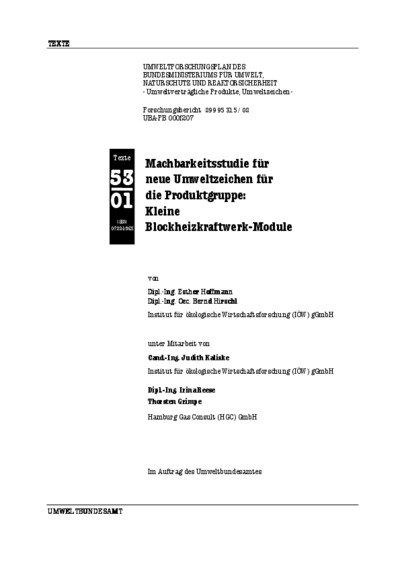Feasibility study for new ecolabels according to ISO 14024 (Type I) within the product group:
This study is a feasibility study according to ISO 14024. It deals with the question whether an ecolabel is suitable for small cogeneration plants and how concrete criteria for an ecolabel on cogeneration plants could be specified. The study began with a comprehensive market analysis in order to identify possible plants for which an ecolabel would make sense. In the main part of the study, the environmental relevance of the chosen plants was analysed. For this analysis, plant manufacturers were interviewed and a comparison between cogeneration plants and heating plants was carried out. On the basis of this analysis, it was possible to derive a number of criteria which were presented and discussed in an expert talk by various company representatives and experts in this field.
As a result of the expert talk and the investigation process as a whole, the introduction of an ecolabel for small cogeneration plants can be recommended. The proposed certification principles comprise requirements regarding the compliance with directives, efficient energy use (electrical and overall efficiency factor under partial load and nominal load, mentioning the plant’s supplementary energy consumption), emission values for CO, NOx, dust and organic substances, sound emissions, the offer of maintenance contracts, plant take back obligations, as well as requirements with regard to the operating instructions. The transcription of the label is proposed as “Ecolabel ... because energy-efficient”.
Besides cogeneration plants based on engines, the study also focused on small stationary fuel cells. They are currently in the development phase and are tested within the scope of several field studies. Compared to conventional
heating plants and cogeneration plants powered by engines, this new technology promises clear ecological advantages and constitutes a future alternative to engine powered equivalents. Faced by the current
state of development and the limited quality of the available data, it is not possible at the moment to derive concrete criteria for an ecolabel in this field. After the introduction of initial products onto the market, corresponding
requirements for plants based on this new technology should be specified.



